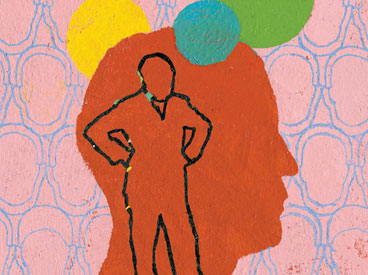What causes ADHD? One thing’s for certain. It is not a result of bad parenting, as some people think. We may disapprove of parents who can’t or won’t restrict Junior’s channel surfing, cell-phone use, texting, and multitasking, but that indulgent parental style has nothing to do with the condition. Parents may be responsible for another reason, however: ADHD is highly heritable. And there is suspicion that conditions in the womb can increase a child’s risk. Studies show that smoking during pregnancy increases the risk that a child will have ADHD, according to psychiatrist Tim Wilens of Massachusetts General Hospital, a specialist in treating adult ADHD. Scientists also suspect that exposure to certain environmental contaminants, such as pesticides, is a factor.
It is not clear why some children grow out of ADHD by adulthood and some do not. But there is no such thing as adult-onset ADHD: If you did not have it as a child, you do not develop it as an adult. Instead, adults with ADHD represent the 60 percent or so of children who did not grow out of it. That’s why a credible diagnosis of adult ADHD requires a paper trail—pediatric medical records, school records, recollections of the adult’s childhood friends and family—indicating that the person had the childhood form, even if it was not formally diagnosed at the time.
An adult with ADHD is more likely to say inappropriate things at meetings.
Adult ADHD is almost always ADD—that is, without the hyperactivity. Once you reach adulthood, hyperactivity symptoms tend to go away. There are other differences as well, says psychiatrist Jeffrey Newcorn of Mount Sinai. The adult form is characterized more by difficulties with executive functioning than by simple inattention. Executive function is basically the set of neurocognitive processes that let you organize your behavior across time to achieve your goals. These range from small goals like having dinner on the table on time to major ones, such as setting priorities at work and home. “It’s managing your time, organizing your schedule, running your life, meeting deadlines,” said Newcorn, adding, “Adults drift off to other things when they decide the first one is boring or uninteresting. They have a lot of files and programs open on their computer. They might be unable to have a conversation without changing the topic every 30 seconds.” And since deficits in executive function lower inhibition, “an adult with ADHD is more likely to say inappropriate things at meetings,” says Newcorn. “Colleagues sometimes interpret the behavior as a need for attention or a refusal to get with the program.”
And although the hyperactivity component is rare, it is not unheard of. “You do find some adults with ADHD who race around all the time and can’t relax,” says Newcorn. Some use drugs such as marijuana “to self-medicate, to relax,” saying, “it really helps me slow my thoughts.”
Although most people think of adult ADHD as impairing performance at work or school, it can also throw a wrench into relationships. “The ADHD spouse will tend to have lots of ideas but have a hard time following through,” says Robin, citing personal experience; that brilliant plan to redo the bedroom winds up with the room remaining a construction zone for months. “They also find it hard to move from the big picture to details,” she says, so let’s go away for the weekend never results in actual reservations at that quaint inn.
“We go from A to B to C to Z,” says Robin, “and the non-ADHD spouse has a hard time following.”
As with almost every mental illness, a combination of medication and psychological therapy can markedly reduce symptoms of ADHD in adults. Stimulants such as Ritalin (methylphenidate), which are also used to treat childhood ADHD, help many adults as well, says Wilens. So does Strattera (atomoxetine), which the FDA approved for adult ADHD in 2002. Still, “the evidence supporting the use of (drugs) for adults with ADHD remains less established” than it is for children, and most studies were short term, Wilens and colleagues concluded in a review article last October. “With medication, you typically see a clinically significant improvement in symptoms by six weeks, once you get the dose right,” says Wilens. But that falls short of a true cure. “You might not be as distracted, but you’re still distracted. You still have to monitor your environment to minimize distractions,” he says. Scientists believe the drugs work, to the extent they do, by targeting the neurochemical systems that seem to underlie ADHD: dopamine and norepinephrine. Both are in areas of the brain that imaging has shown to be affected in ADHD, the former in reward circuitry and the latter in attention circuitry.
Adults with ADHD also benefit from cognitive-behavioral therapy. They learn, for instance, to understand the environmental conditions that increase distraction and develop strategies to minimize them.
Even as adult ADHD gains recognition from health experts, it tends to have a bad reputation among the rest of us. To many, it’s a great excuse for why a co-worker didn’t finish his part of the group assignment on time or a trendy amateur diagnosis applied to people who refuse to buckle down and focus. It is, to skeptics, a set-up for a joke: “the man with adult ADHD was trying to daydream but his mind kept wandering.”
Those with a formal diagnosis are eligible under the Americans With Disabilities Act for “reasonable accommodations” at work. What does that mean? It can be as simple as allowing the ADHD worker to use headphones to listen to music—“sometimes an ADHD brain needs something to occupy part of it so other parts can focus,” says Robin. Someone with ADHD might focus better if she takes more frequent breaks, or checks in with a supervisor more frequently to make sure of staying on task. Which is not to say there is not abuse.
When baseball player Andres Torres began to speak publicly about his struggles with ADHD, there were snickers: Players with ADHD are allowed to take otherwise banned drugs—in this case, stimulants. Last season, of 111 drug exemptions the major leagues granted, 105 were for ADHD.
One was for Andres, an outfielder who struggled after signing with the Detroit Tigers in 1998, spending a decade in the minor leagues. He was diagnosed with ADHD in 2002 and began taking medication. As one sports writer put it, “Discerning a fastball from a changeup is difficult enough; imagine doing it with untethered focus, attention meandering.” On the medicine, his batting average soared, and he finally reached the major leagues in 2009. “Everything started clicking,” Andres told The New York Times. Having the disorder, he said, “is like being in your own world.”
To read comments from Ty Pennington, Andres Torres, and others with ADHD, visit saturdayeveningpost.com/adhd.
Sharon Begley’s last article for the Post, “The Cholesterol Conundrum,” appeared in the May/Jun issue.
Become a Saturday Evening Post member and enjoy unlimited access. Subscribe now




Comments
Thanks for this excellent article.
Many have concerns about the diagnosis and treatment for ADHD. The problems with ADHD treatments and meds circle around three essential themes.
The three main problems:
1. ADHD Diagnosis is superficial at best, based often on appearances, and not related to the many excellent peer reviewed findings in brain scans and brain research for more than 20 years. The DSM-4 is outdated in that it isn’t connected with brain science, and DSM 5 looks like it will provide no significant improvement with the perpetuation of these oversights: http://www.corepsych.com/2010/02/psychiatric-diagnosis/
2. Medication treatment strategies remain capricious, often whimsical, not based upon clear expectations or scientific data: http://www.corepsych.com/2011/05/adhd-medication-dosage/
3. Far too often drug interactions and comorbid conditions remain misunderstood, not identified and ineffectively treated: http://www.corepsych.com/2012/10/adhd-insights-lets-change-the-rules/
Many fresh answers arise with available, relatively inexpensive, data-driven tests that measure a multitude of comorbid biomedical conditions that interfere with medication treatment responses. Dopamine can’t treat serotonin problems, and serotonin can’t treat dopamine [ADHD] problems – in fact each one used incorrectly will make the other comorbid condition regularly worse – and even dangerous.
All these matters are explained in my new book “New ADHD Medication Rules – Brain Science & Common Sense.” In “New Rules” I agree: thousands are treated without considering either brain science or common sense.
cp
Dr Charles Parker
http://www.corepsych.com
“New Rules” here: http://www.bit.ly/rulesbooks
My husband is ADHD, and has a job where he can flit around the office from one task to the next as he has several ‘hats’ to wear, but it took him well into adulthood before he found that job and has been able to stick with it. For my daughter, now 18, the problem with her ADHD is that, to stay interested, work needs to be stimulating, with enough variety to keep her focussed. Unfortunately she also has Autistic Spectrum Disorder, which requires routine, routine, no surprises and routine! I can see that her finding a job after college is going to be quite difficult indeed.
Thank you for putting a human face on this condition. A reason only 1 in 4 adults with ADHD get support is because of the misconceptions and lack of understanding. ADHD knows no socio-economic or intellectual barriers. Smart, creative people can hide the overwhelm and “brain swirl” through shear effort. Unfortunately this effort comes at a great cost of added stress and the additional health challenges related to increased stress.
To my mind, it is the sneering of the dedicated disbelievers who constitute the nastiest part of being adult ADHD. Would they dare to tell the person with a club foot or a cleft palate that they could dance or sing if they just tried a bit harder? Or tell an Alzheimer’s patient that he is just faking his memory loss?
In my 60s I am in the unenviable position of having had “lots of potential” since grade school, never grasping why the projects I could see so clearly never came to fruition. Diagnosed at 58, I understand the problem now, but it’s way too late for me. But we can at least help the younger people who have their lives ahead of them.
Thank you for a well written article that vividly describes what having ADHD can be like for adults. And it’s true – many adults are not diagnosed until later in life. I found out myself at age 42 while I was having my daughter evaluated.
While I wince at the term “mental illness”, I suppose that it is technically correct since ADHD is considered a disability under Federal Law.
I do challenge the notion that children outgrow ADHD and that adults tend not to have hyperactivity. I believe that children, as they mature, learn to manage their symptoms more effectively and may appear to have outgrown their ADHD. Also, adults tend to be better at hiding their symptoms than children.
As far as the hyperactivity is concerned, again I believe that it is merely channeled differently, showing up as perhaps excessive talking or juggling too many projects at once.
Thank you again for an excellent article.